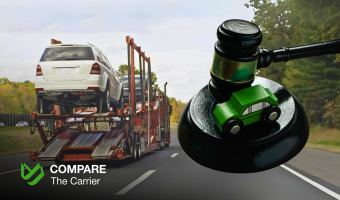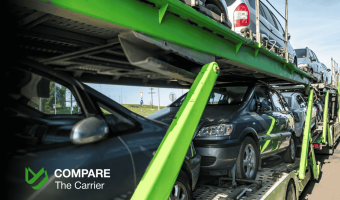Navigating the auto transport sector requires a keen understanding of which providers are reliable and, more importantly, which auto transport companies to avoid.
The sheer volume of options in the U.S. market can make it challenging to differentiate credible services from potential car shipping scams; an oversight in this selection process can lead to significant complications and expense.
This guide is designed to equip you with the practical knowledge needed for robust car shipping scam prevention, ensuring you can identify red flags and secure a trustworthy carrier for your vehicle’s transit. If you’re currently vetting companies, the information here is vital for making an informed decision.
Compare the Carrier is dedicated to simplifying your search, offering a platform to assess quotes from reputable auto transport services and save you valuable time and resources.
How Do Fraudulent Car Shipping Companies Work?
With more vehicles hitting the roads every year, the demand for auto transport services has surged. Predictably, this boom has also rolled out the red carpet for scammers eager to exploit unsuspecting customers. While the U.S. is home to a vast number of professional, reputable auto transport companies that pride themselves on integrity and excellent service, there’s an undeniable underbelly of operators solely focused on a quick, dishonest buck. It’s important to understand what the worst auto transport companies have in common to recognize them early. These auto transport scams are a persistent threat, and understanding their methods is crucial for robust car shipping scam prevention. If you’re not careful, you could easily become a victim of shipping scam.
So, what tactics do these fraudulent outfits employ? Most car shipping scams can be broadly categorized, as shown below:
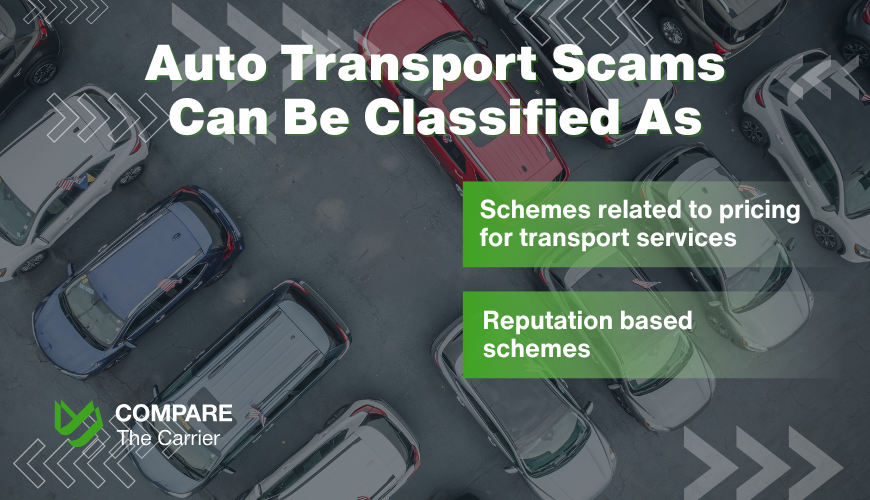
They can be classified as follows:
The Most Common Types Of Auto Transport Scams
When you’re trying to avoid becoming a victim of shipping scam, it pays to know exactly what you’re up against. Here are some of the most prevalent car shipping scams you might encounter:
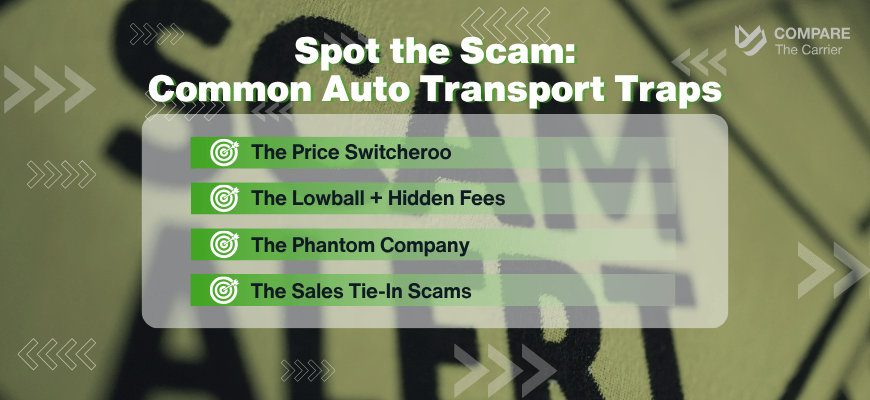
The Price Switching Scam
This is a classic bait-and-switch. The company quotes you a price that seems reasonable, or even a great deal, to get your business. You sign a contract, often with fine print stating that the price is an “estimate” and “subject to change”. In some predatory agreements, there’s no specified limit to this change, or the potential increase can be substantial. Here’s how it typically unfolds: the entity you booked with (often a broker) secures your order with that lowball quote. Understanding the fundamental difference between carrier and broker is essential to grasp how this scam operates. Then, they search for an actual carrier.
Since their initial quote might be too low to attract a legitimate carrier quickly, they might eventually agree to a higher price with a carrier. Once your car is loaded and on its way, they hit you with the inflated price. The contract you signed supposedly gives them leeway to do this. The actual trucking company (the carrier) isn’t necessarily the culprit here; they’re fulfilling a contract they signed with the broker/shipping company at an agreed price.
However, carriers often have the right to hold your vehicle until they receive full payment as per their agreement with the broker. This leaves you in a terrible spot: pay the higher price or risk not getting your car back in a timely manner, if at all. This is a serious red flag for auto transport companies to avoid.
The Lowball Offer with Hidden Fees
In this scenario, a company lures you in with an exceptionally low base rate for shipping your car. Once you’re well into the booking process, having invested time and provided your information, a slew of additional, often vaguely explained, fees suddenly appear. These can be labeled as “processing fees,” “service charges,” “fuel surcharges,” “listing fees,” or “special loading fees”. By the time they present the final contract, the total cost is significantly higher than the initial quote. The strategy here is that the dishonest salesperson hopes you’ve already committed enough time and energy that you’ll agree to the higher price just to get the process over with and avoid starting your search again.
While this particular auto transport scam can sometimes be easier to spot if you’re vigilant (allowing you to cancel the transaction before you’re locked in ), it can be devastating if combined with other tactics like the price-switching scam.
Fake or “Cloned” Transport Company Websites
Scammers are adept at creating sophisticated-looking websites that mimic legitimate, well-established auto transport companies, or they might invent a company from scratch that looks entirely professional. These sites can feature convincing testimonials (usually fake), information “About Us” that paints a picture of reliability, and even what appear to be legitimate licensing numbers. It can be incredibly difficult to tell that the entire operation is a facade designed to collect deposits or full payments for services they never intend to provide. Asking the top questions to ask your transport company before committing is a crucial area for car shipping scam prevention.
Fraud Involving Vehicle Sales Transactions
Auto transport scams aren’t always isolated to the shipping service itself; they can be intertwined with fraudulent vehicle sales. Here are a couple of ways this plays out:
How To Identify A Fraudulent Shipping Company?
Spotting a company you should steer clear of—a prime candidate for the list of auto transport companies to avoid—isn’t overly complicated if you know the warning signs. Pay close attention; the following red flags should immediately raise your guard, helping you differentiate between scammers and the top 25 best car shipping companies:
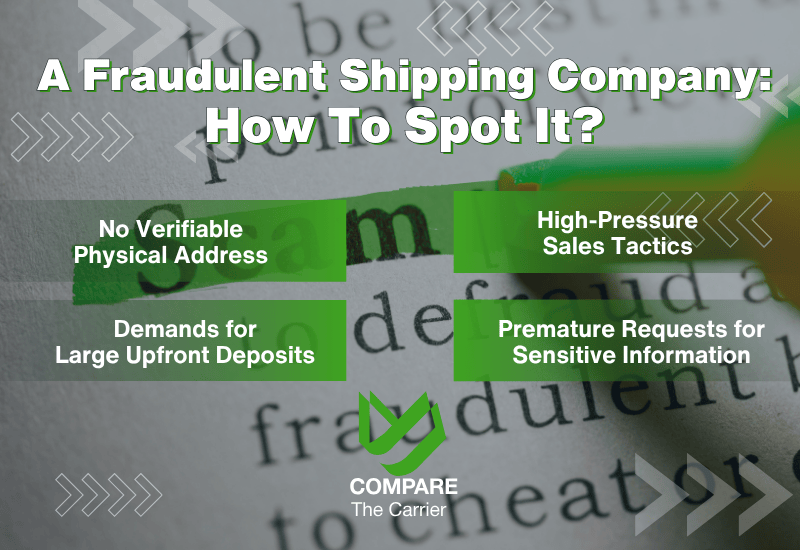
How To Avoid Fraudulent Car Shipping Company?
To make sure you sidestep auto transport scams, here’s your due diligence checklist. Before you even think about sending money or signing on the dotted line, you absolutely must:
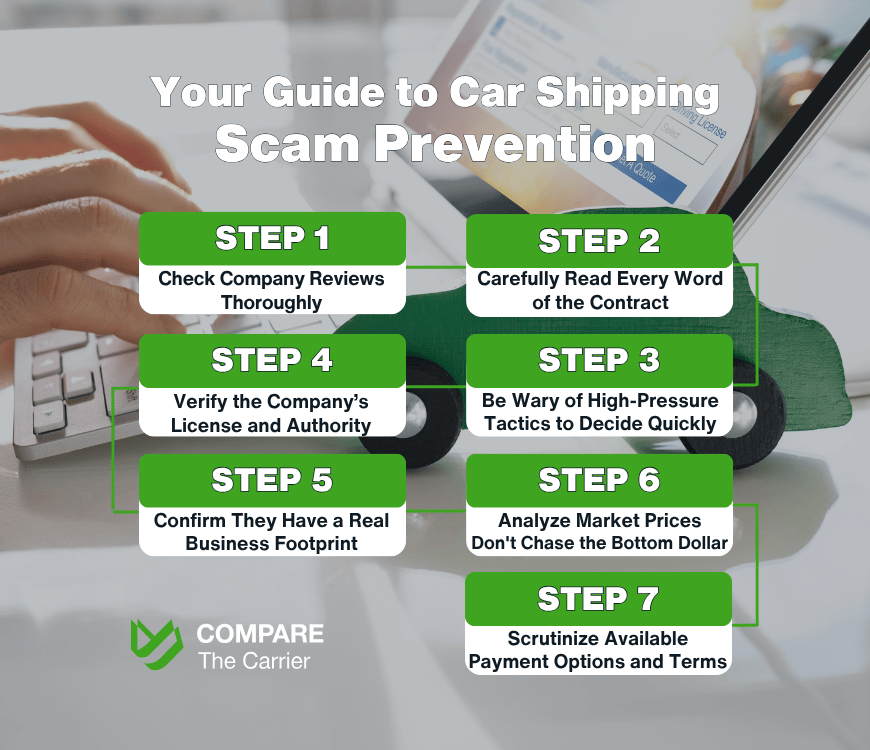
What To Do If You Are A Victim Of A Scam Shipping Company?
If you’ve unfortunately been targeted by one of these auto transport scams, it’s crucial to take specific actions. As of 2026, the primary regulatory bodies and reporting procedures remain your strongest allies in seeking recourse and helping prevent others from falling into the same trap. Here’s how to respond:
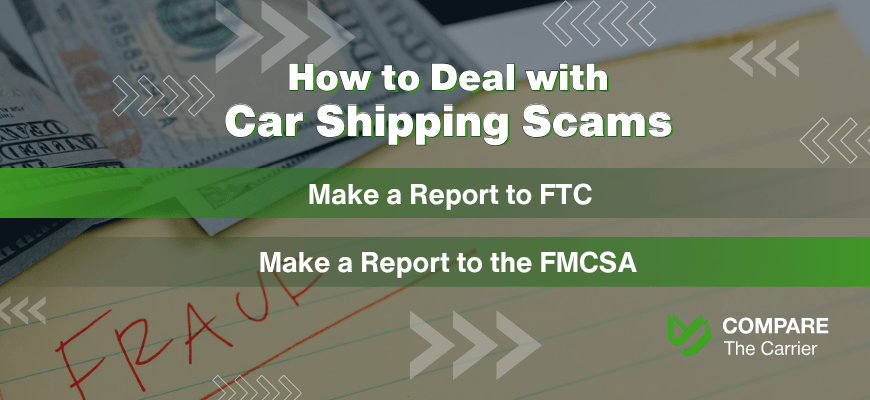
Successfully navigating the complexities of car shipping requires ongoing vigilance to avoid falling prey to auto transport scams.
At Compare the Carrier, we understand these challenges and are committed to providing you with access to reliable and transparent services. By being informed about the tactics used by fraudulent companies, recognizing the red flags, and understanding the best practices for car shipping scam prevention, you can safeguard yourself against becoming a victim.
Remember, knowledge is your best defense when dealing with auto transport companies to avoid. Always conduct thorough research, seek transparent communication, and trust your instincts; these are the core strategies that can help protect your car during shipping. If you suspect you’ve encountered a scam, don’t hesitate to take action and report it using the resources above.
With Compare the Carrier’s guidance, you can confidently and safely navigate the world of auto transportation, ensuring a stress-free experience for your vehicle’s journey.
FAQ
What is the number one red flag when hiring a car hauler?
The most critical warning sign is an unusually low quote. If a price seems too good to be true, it likely is. Unscrupulous brokers often use “lowball” rates to lure customers, only to demand extra fees once the vehicle is on the trailer. Always compare multiple estimates; a quote 25% below the market average is a classic indicator of a potential scam.
What are the most common car shipping scams to watch for in 2026?
Common industry scams include “double brokering,” where an unlicensed entity illegally resells your contract, and identity cloning. You should also be wary of companies demanding untraceable payment methods like Zelle or wire transfers. Legitimate transporters typically charge a small deposit or the full amount via credit card or secure electronic systems only after a carrier is officially assigned.
What should I do if I am a victim of a vehicle transport scam?
If you’ve been targeted by a fraudulent shipping company, immediately report the incident to the FMCSA’s National Consumer Complaint Database. Additionally, file a report with the Federal Trade Commission (FTC) and the Better Business Bureau. If you’ve already made a payment, contact your bank to freeze the transaction or initiate a chargeback for services not rendered as described.
How can I verify if an auto shipping company is legitimate?
Always check a company’s USDOT and Motor Carrier (MC) numbers via the official FMCSA SAFER website. A legitimate provider must have an “Active” operating status and valid insurance. Beyond licenses, verify their physical business address and look for a professional website. If they communicate solely through generic email accounts or WhatsApp, it is a significant sign of a non-credible business.
Why is relying solely on online reviews risky for car shipping?
While helpful, online ratings can be manipulated. Many dishonest operators use “review farms” to post hundreds of fake 5-star ratings in short bursts. To spot authentic feedback, look for detailed descriptions of the transport process, mentions of specific driver interactions, and photos. A sudden influx of generic, short praise often indicates an attempt to hide a history of poor service or scams.

